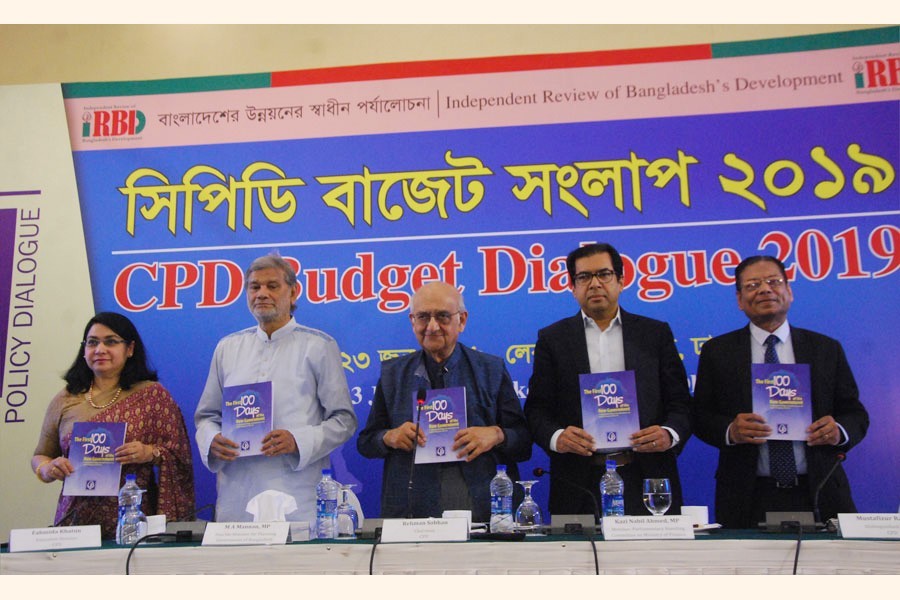
Published :
Updated :

Higher bank borrowing target to meet the budget deficit will worsen the private investment drought as money market faces an acute shortage of funds spawned by rising troubled loans, speakers warned on Sunday.
They said the recapitalisation of banks at the cost of public resources cannot be justified since this money in turn ends up in the pockets of top defaulters.
They were critical of providing power subsidies, saying such incentives breed corruption and perpetuate the inefficiency of the electricity sector.
The views came at the budget discussion organised by the think-tank Centre for Policy Dialogue (CPD) at a city hotel.
Professor Rehman Sobhan, chairman of the CPD presided over the discussion, where planning minister MA Mannan was the chief guest.
Finance minister AHM Mustafa Kamal, who was supposed to attend the discussion as the chief guest, skipped it on health grounds.
Former commerce minister and BNP leader Amir Khosru Mahmood Chowdhury and Awami League lawmaker Kazi Nabil Ahmed were the special guests.
The discussants stressed the new trade policy needs to overcome economic hurdles in the wake of trade war between the United States and China and growing automation in the garment sector, which impacts employment adversely.
Defending electricity subsidy, Mr Mannan said there is no power outage anymore and each and every village of the country has now power access.
The bank borrowing is not a new source for budget financing, he said, insisting it will be made through better management so that there is no "crowding-out impact" on the economy.
"We've lots of foreign funds remaining unused in the pipeline," he said.
The minister said the government never interferes in the market, which "determines everything here in the country."
Terming the market forces (demand and supply) as 'God', Mr Mannan said the economy is tilted towards a full-fledged market economy.
About inequality, he said they have been working hard to further reduce the gap by transforming each village into a vibrant economic unit.
But BNP leader Amir Khosru Mahmood Chowdhury disagreed with the minister's claim, noting a vested quarter instead of market forces influences the economy and budget preparation.
"We know them -- they are involved in business and sitting in Parliament and some are bureaucrats too," said Mr Chowdhury, who is a standing committee member of the Bangladesh Nationalist Party (BNP).
Mr Chowdhury said there is a "circle" who consumes each and everything. "Honest people and businesses have been paying dues while the circle remains busy laundering it(black money) ," he said.
"I don't find any rationale behind imposing taxes on the retained earnings as genuine businesses keep it for further investment and employment creation."
Mr Chowdhury, a former commerce minister, said the struggling banks have no money but the government has eyes on borrowing Tk 470 billion from the banking system.
Criticising the recapitalising banks by the government, Mr Chowdhury said these institutions are dying from capital shortfall and the government is allowing them to die.
The government is abusing public money in the name of recapitalisation to patronise the organised racket, Mr Chowdhury alleged.
Former lawmaker Fazlul Azim said the state agencies or machinery often show less interest in executing the government's order in many cases.
He said once the government says the rate of interest would be brought down to single digit from tomorrow but "that tomorrow never came." "This has to be addressed very carefully," he said.
He suggested readjustment of the local currency through its gradual depreciation.
Economics professor Dr Barkat-e-Khuda said private sector investment has remained stagnant over the years.
"Can the public sector create decent jobs for a large number of unemployed citizens?" he asked .
He said small and medium-sized enterprises (SMEs) can generate employment on a large scale and this sector needs government support in terms of access to credit and access to skill development.
"I don't see much of it gets reflected in the budget document," he added.
Former FBCCI adviser Manzur Ahmed suggested the government should see the banking sector as a crisis management affair.
"But there is no indication of how the banking system will be improved here," he said.
Professor Rehman Sobhan said all are well aware of the sources of problems but do not take required actions, which is unexpected.
About the rising inequality, he said the government can address the problem in part through ensuring proper utilisation of the public expenses in the form of subsidy and exemptions.
Lawmaker Rumeen Farhana said Bangladesh is a country where the ultra-rich are growing fast and it is also a nation among the top five in terms of the poor.
"So, inequality is growing fast here, but we don't see any direction towards reducing the level of inequality in the budget," she said.
Former finance minister M Syeduzzaman termed the current environment businessmen-friendly, not business-friendly.
He laid emphasis on forming a trade policy reform commission to create a conducive atmosphere for business.
Former chairman of Association of Bankers' Bangladesh (ABB) Nurul Amin said three types of taxes, including higher excise duty, have been imposed on deposits.
"Why will people deposit money?" he questioned.
He suggested taking more funds from the capital market to reduce pressure on the banks while strengthening the share market.
jasimharoon@yahoo.com, jubairfe1980@gmail.com


 For all latest news, follow The Financial Express Google News channel.
For all latest news, follow The Financial Express Google News channel.